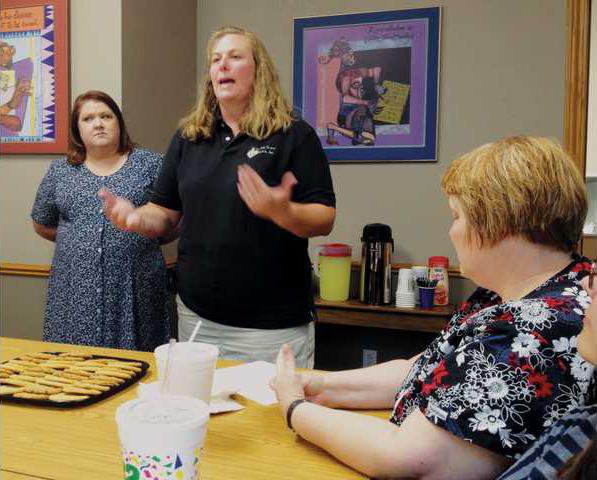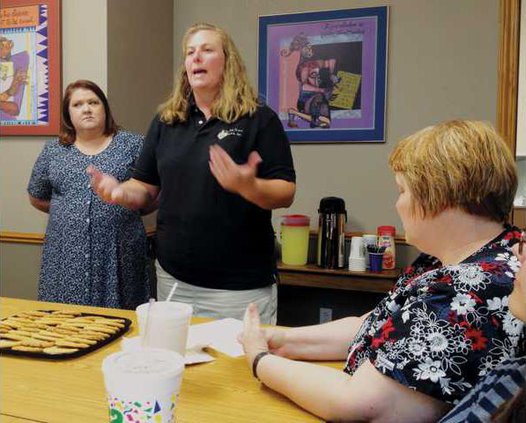When authorities learn a child has been abused, the child enters a system that sometimes serves to re-victimize the child. Fear and confusion on the part of the child can jeopardize the case against the perpetrator and ultimately, more children are destined to be hurt.
A host of collaborating agencies in Barton county want to change that. Wednesday afternoon, representatives met at the Great Bend Family Crisis Center to sign an interagency agreement signifying their commitment to and support of the new Dell Hayden Memorial Child Advocacy Center.
Family Crisis Center Executive Director Laura M. Patzner, and her father Jim Hayden, widower of the late Dell Hayden, and Kelly Johnson from Healing Hearts Ranch were on hand to thank those supporting the center and discuss the next step in making the center a reality.
“This center is something that my mom believed in pretty strongly, so we get to live on with her,” Patzner said of the center baring her mother’s name. With the signing of the agreement, the Hayden CAC became a developing associate member of the National Children’s Alliance, which is the accrediting body of all advocacy centers in the nation.
Johnson said a CAC is a one-stop shop where children that have been identified by law enforcement or Social and Rehabilitation Services as being either physically, sexually or emotionally abused can be brought to obtain one interview for prosecution and referral services. Research has shown us that children who have been abused and then gone through multiple interviews change their story, don’t remember, get things twisted around or are in a different emotional state than they were in closer to the event.
It makes it really difficult to prosecute the perpetrator.
Patzner said they have a two-year time line in which to get the center fully operational. The next step is getting the equipment in place, then beginning the interviews and working with the multi-disciplinary teams.
“From the medical standpoint, when you see a child brought into the emergency room in an acute setting, and we have to send that child that has already been through trauma, as well as their family, and we have to send that child onto Hutchinson or Wichita or Hays or wherever for this exam and this interview, that is just more trauma and stress,” said Jacquie Disque, an obstetrical and pediatric nurse manager at Great Bend Regional Hospital.
SRS investigator C.J. Pata added precious time is lost getting the victim from point A to point B. In that time, they risk losing the whole case. In 2010, in Barton County, roughly 12 children made it all the way through the system, Pata said. She interviews several children each month, and often investigators from other counties in western Kansas are brought in to help keep up. Not all will make it to court, she said.
“I think its an amazing opportunity that we have here in Great Bend, and we’re very blessed to offer this to our community,” she said.
In a nutshell, the CAC model works when law enforcement or SRS notify the Family Crisis Center when they have a child that needs service. They transport the victim to the CAC, which will have a room set up with an audio and video recording device, and one forensic interviewer in the room. In another room is the team, consisting of law enforcement, prosecution, medical and mental health professionals and SRS that observes via a live feed.
Team members will be able to ask questions through the interviewer and obtain details. In many cases the child will know that they are being observed. Research has shown the process is beneficial not only for the child, but for the prosecution. The end result is perpetrator accountability.
“There is a huge need for (the center),” said Shelly Schneider, an RN with the Great Bend Children’s Clinic. “There are a lot of gaps that children fall into in Central Kansas that other communities don’t see, because they don’t live it. They think, ‘just refer them to another agency,’ except we don’t have that other agency. This is going to fill a huge void.”
The Hayden CAC will serve Barton County, and later expand to serve Stafford, Pawnee and Rush counties. It will be an activity of the Family Crisis Center and will be housed in the rear of that facility. The staff will consist of the forensic interviewer and a family advocate who will make sure the wrap-around services will happen.
Multiple-disciplinary teams will be dependant on where the crime takes place, and what agencies are involved. All will receive training. There are few additional CACs in western Kansas, with one each in Dodge City, Salina, and Hutchinson.
Funding is still in the works. As a member of the Kansas Chapter of Children’s Advocacy Centers, the Hayden CAC earlier received money for training. In addition, Patzner said Doug Matthews, Barton County attorney, assisted the center with training and other things.
She recently submitted three grants, which she is hopeful will provide funding to fully staff the center and purchase and install the necessary equipment. She hopes to hear soon, and if successful, the center could begin working on cases this summer, as soon as July.
Agency representatives pledging support to the center include: Matthews; Greg Armstrong, Barton County Sheriff; Robert Gunder, chief, Claflin Police Department; Dean Akings, chief, Great Bend Police Department; Kenon Doze, chief, Hoisington Police Department; Art Keffer, chief, Ellinwood Police Department; Margi Marley, Kansas Department of Children and Families; Adina Gregory, Great Bend Regional Hospital; Dr. Marta Edmonds, Great Bend Children’s Clinic; Scott Steinmetz, Healing Hearts Ranch; Mary Miles, Heart of Kansas Family Health Care; Dwight Young, Center for Counseling and Consultation; Chris Ramsey, Juvenile Services; and Patzner.
Agencies pledge support for Childrens Advocacy Center





